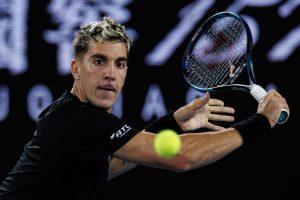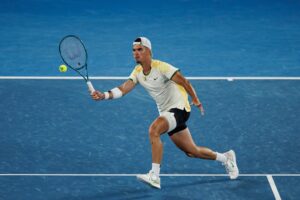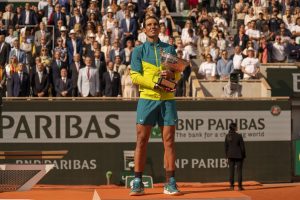Amidst the dramatic final weekend of the 2016 ATP Tour which saw Andy Murray cement his spot at the dominant player on the Tour, some small but exciting news was released. In 2017 Milan will play host to the first ever Next Gen ATP Finals.
Held on 7-11 November 2017, the week before the ATP Tour Finals, this new event will be an end of year tournament for players aged 21 and under. It will be marginally shorter – five days instead of seven – but will follow a similar group-and-knockout format.
The top seven ranked players aged either 21 or younger will automatically qualify whilst a wildcard will make up the final place. Furthermore a number of rule changes and innovations will be trialled in order to continue to grow men’s tennis globally.
“The changing of the guard is coming”
Few would argue that this is not an exciting progressive step for tennis. The success of the sport has always depended on individual, recognisable superstars. The concept of a Next Gen ATP Finals tournament is a superb way of providing an early introduction of players destined for global stardom.
Men’s tennis has commercially ridden on the coattails of Roger Federer, Rafael Nadal, Novak Djokovic and Andy Murray for a number of years now. Following this golden generation is going to be a tough feat, both for the players and the marketing of the sport.
ATP Executive President and Chairman, Chris Kermode, sums up how the Next Gen ATP Finals will help develop the future names that will be recognisable around the world.
“The next generation of players coming through on the ATP World Tour is gathering huge momentum. The big focus for us is we’re at this incredible time in tennis where we’re at almost the changing of the guard.
“We have superstars in the game that have transcended the sport over the last 10 years, reached beyond tennis and become global sporting icons, Roger, Rafa, Novak and Andy in particular. But the changing of the guard is coming.
“We have a duty to start highlighting and really bringing to life characters in the game that are coming through with immense, immense talent. This is the future of the game.”
This tournament may prove hugely important in, as Mr Kermode puts it, “bringing to life characters in the game”. In order for tennis to maintain its popularity in the future, there needs to be some recognisable and relatable personalities leading the charge. This new venture may prove a perfect platform for these youngsters to widen their appeal and global recognition.
How interesting would the Next Gen ATP Finals actually be?
Something to consider is how much of a draw this tournament will actually be. On current standings, the players who would be in Milan next year would be Alexander Zverev, Borna Coric, Karen Khachanov, Taylor Fritz, Daniil Medvedev, Hyeon Chung and Jared Donaldson – with a further player obtaining a wildcard. This is, of course, highly unlikely to be the exact line-up in Milan next year.
Nevertheless, there are some exciting names in that mix. Alexander Zverev and Borna Coric are already establishing themselves on the ATP Tour. Meanwhile, Karen Khachanov and Taylor Fritz have both enjoyed minor breakthrough success in 2016.
What the tournament may not hope for is a cluster of players from one or two nations. This is a reasonable fear given the crop of Americans making inroads on the ATP Tour. Currently eight of the top seventeen players who could qualify for this event are American. Whilst exciting for Americans, this could alienate global fans and this is where the wildcard would at least help to broaden the range of viewership. You would hope that the wildcard would go to one of the top ranked juniors who may fall just short of qualification. The exciting Canadian pair of Felix Auger-Alliassime and Denis Shapovalov or Greek star Stefanos Tsitsipas spring to mind.
Something which may not bare much relevance now but could in the future is rivalries. Tennis history is littered with great rivalries. Sampras and Agassi, Connors and McEnroe, Federer and Nadal. They can be era defining. The Next Gen ATP Finals have the potential to kick start future rivalries. Who is to say that Zverev and Coric won’t be the next addition to that list?
“It’s a win-win situation here”
Away from the tournament itself, the qualification process adds another dimension to the 2017 Tour. As the last few weeks have shown, it is fascinating – if not slightly stressful – to watch players battle for spots at World Tour Finals during the concluding weeks of the Tour. The Next Gen ATP Finals will no doubt enhance this.
Speaking to the ATP, Stefan Edberg suggested that, “I think a lot of these guys are really, really going to battle it out to get into this tournament because there’s going to be attractive prize money and it’s going to be a good way for them to promote themselves. It’s a win-win situation here. It’s definitely the right move to do it. If I was young, I would love to have had this setup.”
The idea that they will battle it out seems to already have been confirmed by American Frances Tiafoe. At the launch of the event in London he said, “We’re incredibly excited about the event. It’s definitely going to be a great event.
“I want to thank the ATP for everything they’ve done launching the Next Gen. It was a huge deal for us, a bunch of different personalities. I think it’s going to be a really good turnout and I’m really excited for it.”
Caution over rule changes
The one announcement that was greeted with trepidation was the decision to trial new rules. Confliction was the overriding reaction to this news. On the one hand, tennis is a sport steeped in tradition and to start introducing four game sets regularly on the Tour seems barbaric. On the other hand, if you are going to trial new technology, doing it with future players makes sense.
Public comments in tennis.com’s article about the tournament were hostile to say the least. The harsh reality is that tennis will need to adapt over the coming years though. In a world dominated by social media, tennis needs to make itself more manageable to the consumer. Trialling these new systems with the generation who are growing up immersed in this world is smart. It allows for testing of what works and what doesn’t.
That said, the ATP has to be careful. Too many radical changes will alienate large fragments of tennis’ fanbase. Tennis can’t afford to lose its soul. In the Next Gen ATP Finals, Chris Kermode might just have found the right environment to conduct trials.
Putting aside the understandable doubts about rule changes, this event is intriguing. The #NextGen marketing campaign has been a growing success throughout 2016 and this seems the next logical move forward. Of course, we will know more about it’s genuine potential in a years time after the inaugural event. For now though, the concept is certainly strong. Let’s hope the ATP delivers an event to match.
Main Photo:






